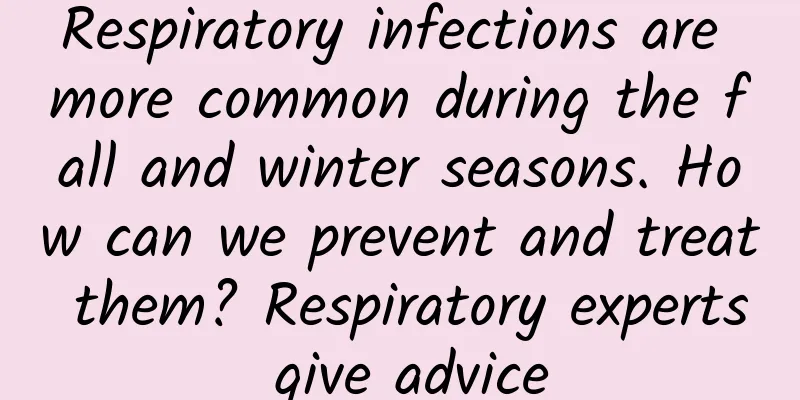Respiratory infections are more common during the fall and winter seasons. How can we prevent and treat them? Respiratory experts give advice

|
Recently, with the change of seasons from autumn to winter and the arrival of cold waves, the number of patients with respiratory infections in the outpatient department of the Respiratory and Critical Care Medicine Department of Hunan Provincial Second People's Hospital (Provincial Brain Hospital) has increased. Zeng Xiangbo, chief physician of the department , said that autumn and winter are the peak seasons for respiratory infectious diseases, and a variety of pathogens such as viruses, bacteria, chlamydia and mycoplasma can cause respiratory infectious diseases. The pathogens that cause different respiratory infectious diseases are different, and the incubation period is also different. For example, the incubation period of influenza is generally 1 to 4 days, while that of whooping cough is 7 to 10 days. However, not all people who come into contact with pathogens of respiratory infectious diseases will become ill, which depends on many factors such as the type of pathogen, the degree of infectivity, and the individual's immune status, health level, degree of exposure, and degree of protection. In the face of this situation, Director Zeng Xiangbo emphasized that scientific response and detailed stratification are the key to preventing and controlling respiratory infectious diseases. He suggested that the public should strengthen the body's defense mechanism, strengthen non-acquired immunity (innate immunity) and pay attention to acquired immunity (such as vaccination). Respiratory infections can be effectively prevented and controlled through measures such as reducing exposure to pathogens, enhancing immunity, cutting off transmission routes, protecting susceptible groups, raising public awareness and education, vaccination, early diagnosis and treatment, environmental hygiene management, and a healthy lifestyle. Especially young children, the elderly and people with underlying diseases and poor immunity are the focus of prevention and control of respiratory infectious diseases. Director Zeng Xiangbo suggested that in addition to maintaining good personal hygiene and a healthy lifestyle, this group of people should also strengthen measures in the following areas: avoid going to closed environments and crowded places, and wear masks if they need to go; wash hands frequently and avoid touching their faces; strengthen daily monitoring of the elderly and young children, and seek medical attention in a timely manner if symptoms occur and take medication as prescribed by the doctor; when there are family members with respiratory infectious diseases, try to avoid close contact with other people, especially the elderly and children. In addition, Director Zeng Xiangbo specifically mentioned the influenza vaccination. The influenza vaccine is an effective means of preventing influenza and its complications, and is suitable for people of all ages, especially high-risk groups such as children over 6 months old, the elderly, pregnant women, patients with chronic diseases, and medical staff. He suggested that the best time to get the flu vaccine is from September to November before the flu season starts, because it takes about two weeks for the body to produce enough antibodies after vaccination. Finally, Director Zeng Xiangbo once again reminded the general public that healthy eating, adequate sleep and maintaining good living habits are essential for enhancing immunity and resisting viral infections. At the same time, following the doctor's advice to take medication in a standardized and reasonable manner and seeking medical treatment in a timely manner are also the key to ensuring that we safely pass through the high incidence period of respiratory infections. Hunan Medical Chat Special Author: Yang Hongxiu and Tian Aiyu from Hunan Second People's Hospital (Provincial Brain Hospital) Follow @湖南医聊 to get more health science information! (Edited by YT) |
>>: A vaccine's autobiography: I am very small, but I am related to you
Recommend
Is 14mm of pelvic fluid serious?
This is a gynecological inflammation, which is no...
What are the methods for selecting bitter melon? Tips on how to make delicious tofu bitter melon soup
Bitter melon can be eaten cold, stir-fried, or ma...
What medicine should girls take to relieve pain during menstruation?
Many women experience dysmenorrhea during menstru...
Can men have anemia? What causes anemia in men?
Anemia is a very common physical symptom, the mos...
Is osteoporosis also "gender-discriminatory"?
This is the 4273rd article of Da Yi Xiao Hu Real ...
Is it normal for a woman to stop menstruating at 47?
As every woman ages, she will gradually enter men...
I get acne as soon as I put on makeup
It is normal to have acne on your face. There are...
Can I wash my hair during menstruation?
Many girls like to wash their hair, especially th...
What should pregnant women eat to replenish qi and blood?
What should pregnant women eat to replenish qi an...
Clinical manifestations and treatment measures of bleeding in late pregnancy
I believe that everyone must be familiar with the...
Can women still have sex after menopause?
After menopause, women's body functions in al...
How can kidney stones be expelled?
I believe everyone is familiar with kidney stones...
Can I eat oysters during my period?
Pickled raw shrimp is a kind of seafood that many...
What are the harms of blowing hair during confinement?
Confinement is a big deal for women. There are ma...
Heavy menstrual flow with blood
Menstruation is a normal physiological phenomenon...









